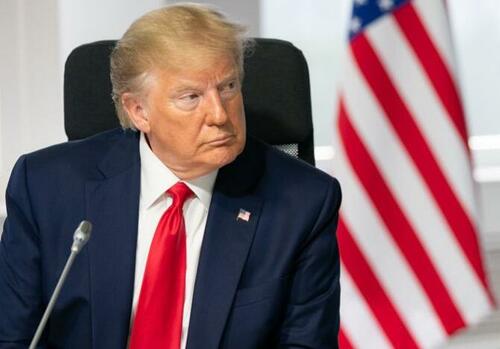
Authored by Richard Porter via RealClear Politics,
Jury selection is underway now complete in the case of The People of the State of New York vs. Donald J. Trump, which alleges that the defendant lied to his own check register, and lied to the general ledger of his own company, when the invoice given to him by his lawyer was paid and recorded by someone else, and that the misstatement he made to himself in his own records was done “with the intent to defraud and intent to commit another crime and aid and conceal the commission thereof.”
It is often noted that this is the first time that a former U.S. president is being tried for a crime, although Ulysses S. Grant may (or may not) have been cited for speeding in his carriage. The federal government chose not to prosecute Bill Clinton, who lied under oath during a sexual harassment lawsuit and then dissembled again about sex before a grand jury. Clinton lost his law license, settled the case on unfavorable terms, and was sanctioned by both federal and Arkansas state courts.
So, this is a first. And let’s be honest about who is doing what to whom and why.
The prosecutor elected in New York County of New York state indicted Trump, after Trump announced his 2024 run for president, for allegedly violating New York Penal Laws 175.05 and 175.10 seven years ago.
That local prosecutor, Alvin Bragg, is a member of the Democratic Party – and the voters who elected Bragg and from whom the jury will be chosen support the Democratic Party. In 2016, the people of New York County voted 87% for Hillary Clinton and 10% for Donald Trump, and in 2020, 87% for Joe Biden and 12% for Donald Trump. In other words, the jury pool is chosen from one of the most partisan jurisdictions in the country – a place where almost all the judges are Democrats as well.
So the Democratic prosecutor elected in the second most Democratic county in the United States will try the former Republican president and current putative Republican Party presidential nominee before a Democrat-appointed judge and a jury drawn from a pool 87% of whom voted against him (and who are being asked if they watch Fox News or listen to talk radio in the screening process).
One wonders if the law even matters. But let’s review the two statutes at issue to highlight what the law requires the prosecution to prove. First, the prosecutor must prove that Trump violated the relevant statute, which requires a finding that he falsified business records with intent to defraud – that he “makes or causes a false entry in the business records of an enterprise.”
By the way, falsifying business records in the second degree is a misdemeanor, not a felony. Moreover, New York’s statute of limitations requires that misdemeanor prosecutions be commenced within two years of the commission of the act, meaning that under the last provision, this case should never have been filed.
Bragg elevated this misdemeanor into a felony by including New York Penal Law 175.10 in the indictment – falsifying business records in the first degree. That statute reads this way:
“A person is guilty of falsifying business records in the first degree when he commits the crime of falsifying business records in the second degree, and when his intent to defraud includes an intent to commit another crime or to aid or conceal the commission thereof.”
There are other obvious difficulties with this case beyond the credibility of the witnesses (a porn star who denied any affair numerous times and a disbarred lawyer convicted of perjury).
For example, why does the entry in the check register or the general ledger matter at all? When would those entries, as opposed to the allegedly false invoices, be shown to anyone for any nefarious purpose? And were the entries even false? Was there any intent to fool someone to obtain something in making the entries – who was the target of the allegedly false entry in private books and records? If there’s no mark, no victim, then how could there be an “intent to defraud”? Defraud whom? And what is the other crime that the person making the book entry intended to commit or hide? If the other crime is not a New York crime but a federal crime, does every county prosecutor in the United States, including Alvin Bragg, have the jurisdiction to enforce an alleged federal crime indirectly through a state crime?
We shall see.
The political nature of this trial is obvious, and unprecedented in the United States. Even with irrefutable DNA evidence that Bill Clinton committed perjury, the special prosecutor declined to press criminal charges against him. In America’s recent past, prosecutors tended to exhibit a modicum of restraint. Those days are apparently gone.
I reviewed an interesting law review article of political show trials down through history, from the trial of Socrates in Athens to the famous show trials in the 1930s Stalinist Soviet Union, curious to see if I could find historical precedent for this trial.
The closest precedent is probably Anne Boleyn’s trial for adultery in 1536. It was about sex, the trial was in a hostile jurisdiction controlled by her accuser, and the whole point of the exercise was to lop off the head of someone who stood in the way of the regime’s continuity. But that’s what Democrats have lusted for since Donald Trump first arrived on the scene, isn’t it? They made no secret of it.
Richard Porter is a lawyer in Chicago and National Committeeman to the RNC from Illinois.
Authored by Richard Porter via RealClear Politics,
Jury selection is underway now complete in the case of The People of the State of New York vs. Donald J. Trump, which alleges that the defendant lied to his own check register, and lied to the general ledger of his own company, when the invoice given to him by his lawyer was paid and recorded by someone else, and that the misstatement he made to himself in his own records was done “with the intent to defraud and intent to commit another crime and aid and conceal the commission thereof.”
It is often noted that this is the first time that a former U.S. president is being tried for a crime, although Ulysses S. Grant may (or may not) have been cited for speeding in his carriage. The federal government chose not to prosecute Bill Clinton, who lied under oath during a sexual harassment lawsuit and then dissembled again about sex before a grand jury. Clinton lost his law license, settled the case on unfavorable terms, and was sanctioned by both federal and Arkansas state courts.
So, this is a first. And let’s be honest about who is doing what to whom and why.
The prosecutor elected in New York County of New York state indicted Trump, after Trump announced his 2024 run for president, for allegedly violating New York Penal Laws 175.05 and 175.10 seven years ago.
That local prosecutor, Alvin Bragg, is a member of the Democratic Party – and the voters who elected Bragg and from whom the jury will be chosen support the Democratic Party. In 2016, the people of New York County voted 87% for Hillary Clinton and 10% for Donald Trump, and in 2020, 87% for Joe Biden and 12% for Donald Trump. In other words, the jury pool is chosen from one of the most partisan jurisdictions in the country – a place where almost all the judges are Democrats as well.
So the Democratic prosecutor elected in the second most Democratic county in the United States will try the former Republican president and current putative Republican Party presidential nominee before a Democrat-appointed judge and a jury drawn from a pool 87% of whom voted against him (and who are being asked if they watch Fox News or listen to talk radio in the screening process).
One wonders if the law even matters. But let’s review the two statutes at issue to highlight what the law requires the prosecution to prove. First, the prosecutor must prove that Trump violated the relevant statute, which requires a finding that he falsified business records with intent to defraud – that he “makes or causes a false entry in the business records of an enterprise.”
By the way, falsifying business records in the second degree is a misdemeanor, not a felony. Moreover, New York’s statute of limitations requires that misdemeanor prosecutions be commenced within two years of the commission of the act, meaning that under the last provision, this case should never have been filed.
Bragg elevated this misdemeanor into a felony by including New York Penal Law 175.10 in the indictment – falsifying business records in the first degree. That statute reads this way:
“A person is guilty of falsifying business records in the first degree when he commits the crime of falsifying business records in the second degree, and when his intent to defraud includes an intent to commit another crime or to aid or conceal the commission thereof.”
There are other obvious difficulties with this case beyond the credibility of the witnesses (a porn star who denied any affair numerous times and a disbarred lawyer convicted of perjury).
For example, why does the entry in the check register or the general ledger matter at all? When would those entries, as opposed to the allegedly false invoices, be shown to anyone for any nefarious purpose? And were the entries even false? Was there any intent to fool someone to obtain something in making the entries – who was the target of the allegedly false entry in private books and records? If there’s no mark, no victim, then how could there be an “intent to defraud”? Defraud whom? And what is the other crime that the person making the book entry intended to commit or hide? If the other crime is not a New York crime but a federal crime, does every county prosecutor in the United States, including Alvin Bragg, have the jurisdiction to enforce an alleged federal crime indirectly through a state crime?
We shall see.
The political nature of this trial is obvious, and unprecedented in the United States. Even with irrefutable DNA evidence that Bill Clinton committed perjury, the special prosecutor declined to press criminal charges against him. In America’s recent past, prosecutors tended to exhibit a modicum of restraint. Those days are apparently gone.
I reviewed an interesting law review article of political show trials down through history, from the trial of Socrates in Athens to the famous show trials in the 1930s Stalinist Soviet Union, curious to see if I could find historical precedent for this trial.
The closest precedent is probably Anne Boleyn’s trial for adultery in 1536. It was about sex, the trial was in a hostile jurisdiction controlled by her accuser, and the whole point of the exercise was to lop off the head of someone who stood in the way of the regime’s continuity. But that’s what Democrats have lusted for since Donald Trump first arrived on the scene, isn’t it? They made no secret of it.
Richard Porter is a lawyer in Chicago and National Committeeman to the RNC from Illinois.
Loading…





